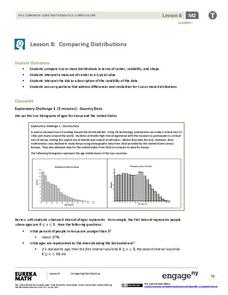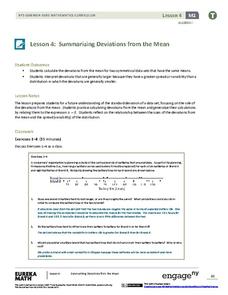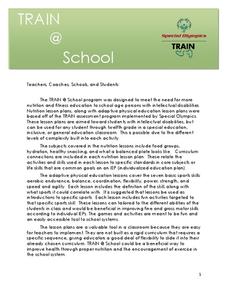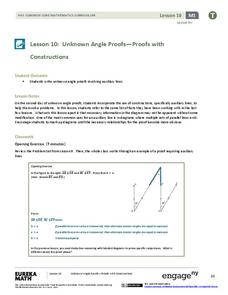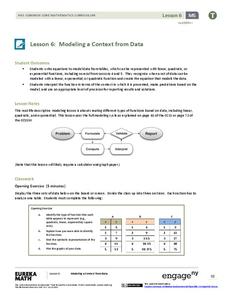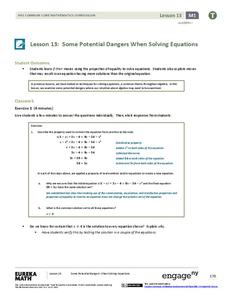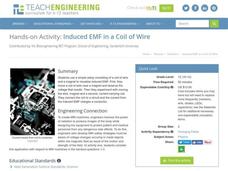EngageNY
Getting the Job Done—Speed, Work, and Measurement Units II
How fast is your class? Learners determine the amount of time it takes individuals to walk a given distance and calculate their speeds. Pupils solve distance, rate, and time problems using the formula and pay attention to the...
Biology Junction
Cnidarians and Ctenophorans
Cnidaria is a broad phylum of 11,000 different species from jellyfish to coral. Most Cnidarians are marine species with a few freshwater examples. A lesson presentation explains the important characteristics of different species of...
Teach Engineering
Floaters and Sinkers
Whatever floats your boat. Young engineers learn about density by measuring the masses and volumes of boxes filled with different materials. Using their knowledge of densities, they hypothesize whether objects with given densities will...
EngageNY
Comparing Distributions
Data distributions can be compared in terms of center, variability, and shape. Two exploratory challenges present data in two different displays to compare. The displays of histograms and box plots require different comparisons based...
EngageNY
Summarizing Deviations from the Mean
Through a series of problems, learners determine the variability of a data set by looking at the deviations from the mean. Estimating means of larger data sets presented in histograms and providing a way to calculate an...
EngageNY
Summarizing Bivariate Categorical Data with Relative Frequencies
It is hard to determine whether there is a relationship with the categorical data, because the numbers are so different. Working with a familiar two-way table on super powers, the class determines relative frequencies for each...
EngageNY
Analyzing Data Collected on Two Variables
Assign an interactive poster activity to assess your class's knowledge and skill concerning data analysis. The teacher reference provides solid questions to ask individuals or groups as they complete their posters.
EngageNY
Analyzing Residuals (Part 2)
Learn about patterns in residual plots with an informative math lesson. Two examples make connections between the appearance of a residual plot and whether a linear model is the best model apparent. The problem set and exit ticket...
Special Olympics
Train at School
Keep your mind and body fit with a fun activity about the five food groups. After going over the functions of fruit, vegetables, grains, meats and beans, and dairy, as well as oils and fats, learners participate in a bean bag toss...
EngageNY
Unknown Angle Proofs—Proofs with Constructions
Provide your emerging mathematicians with the tools to learn as they incorporate auxiliary lines to solve unknown angle proofs in this continuing segment. They decipher information from a diagram to uncover the missing pieces and...
Hong Kong Special Administrative Region
Learning English through Poems and Songs
Exposing learners to the power of words in poetry is a stimulating way to learn languages. Songs, haikus, rhyming words, and narrative works are all employed in a resource for teaching English as a Second Language.
EngageNY
Mastering Factoring
Math class is full of drama—there are so many problems to work out! Pupils work out factoring problems. They use quadratic methods of factoring higher degree polynomials, in addition to factoring the sum and difference of two...
EngageNY
Overcoming a Third Obstacle to Factoring— What If There Are No Real Number Solutions?
Time for pupils to use their imagination! Learners examine the relationship between a system with no real solution and its graph. They then verify their discoveries with algebra.
EngageNY
Modeling a Context from Data (part 1)
While creating models from data, pupils make decisions about precision. Exercises are provided that require linear, quadratic, or exponential models based upon the desired precision.
EngageNY
The Motion of the Moon, Sun, and Stars—Motivating Mathematics
What does math have to do with the behavior of the earth and sun? Learn how the movement of celestial bodies has influenced the development of trigonometry. Scholars connects the details in mathematics to their...
Teach Engineering
Cartesian Diver
Amaze your scholars with an activity that uses a Cartesian diver to demonstrate Pascal's Law, Archimedes' Principle, and the Ideal Gas Law. Groups then repeat the process and make their own diver move up and down in a bottle.
Teach Engineering
Bridge Types: Tensile and Compressive Forces
Bridges rely on tension and compression to keep them standing. Pairs test this principle by constructing simple bridges and applying a force to the center. Teams use the provided worksheet to record their observations of the...
EngageNY
Some Potential Dangers When Solving Equations
Need a less abstract approach to introducing extraneous solutions? This is it! Young mathematicians explore properties used to solve equations and determine which operations maintain the same solutions. They...
EngageNY
Rearranging Formulas
Model for your learners that if they can solve an equation, they can rearrange a formula with a well-planned instructional activity that has plenty of built-in practice. As the instructional activity progresses the content gets...
EngageNY
Graphing Cubic, Square Root, and Cube Root Functions
Is there a relationship between powers and roots? Here is a lesson that asks individuals to examine the graphical relationship. Pupils create a table of values and then graph a square root and quadratic equation. They repeat the process...
Teach Engineering
Induced EMF in a Coil Wire
Small groups investigate the interaction between a coil of wire and a magnet to create an electromagnetic field and observe the voltage they create. Through further interactions, they realize a conductor can be charged from the...
EngageNY
The Converse of the Pythagorean Theorem
Is it a right triangle or not? Introduce scholars to the converse of the Pythagorean Theorem with a lesson that also provides a proof by contradiction of the converse. Pupils use the converse to determine whether triangles with given...
EngageNY
Using Tree Diagrams to Represent a Sample Space and to Calculate Probabilities
Cultivate the tree of knowledge using diagrams with two stages. Pupils create small tree diagrams to determine the sample space in compound probability problems. The lesson uses only two decision points to introduce tree diagrams.
Space Awareness
History of the Universe
Your pupils may believe that you and their parents are the oldest things in the universe, but surprise! There are elements of the universe that are even older. Elementary scientists create a class timeline to demonstrate the...





